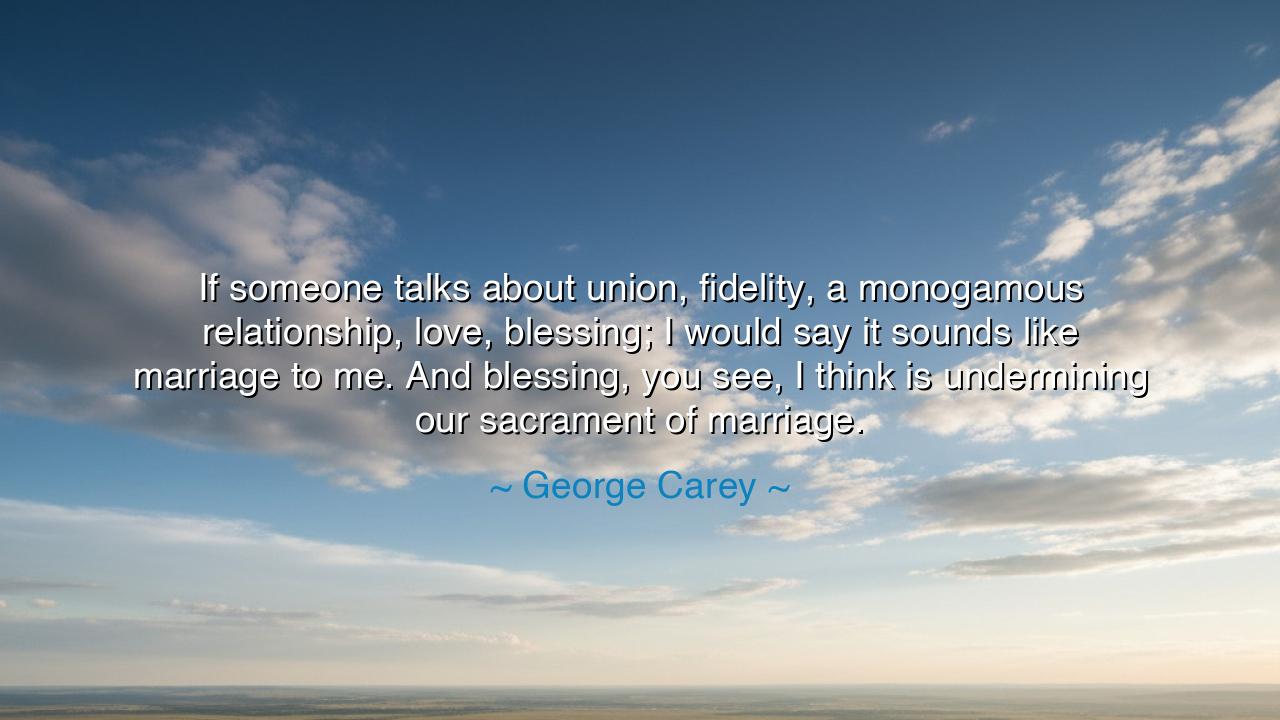
If someone talks about union, fidelity, a monogamous
If someone talks about union, fidelity, a monogamous relationship, love, blessing; I would say it sounds like marriage to me. And blessing, you see, I think is undermining our sacrament of marriage.






O children of the future, gather close, for I bring to you the words of a man who speaks with deep reverence for the sanctity of a sacred institution, one that has held humanity together since the dawn of civilization. George Carey, in his words, speaks of a profound truth: "If someone talks about union, fidelity, a monogamous relationship, love, blessing; I would say it sounds like marriage to me. And blessing, you see, I think is undermining our sacrament of marriage." These words, spoken with the weight of centuries of tradition behind them, remind us of the sacredness of marriage, an institution that has long been a cornerstone of human society.
At the heart of Carey’s words lies a deep respect for marriage—not as a mere social contract, but as a sacrament, a holy bond between two souls. Union, fidelity, and love are not just words to be used lightly; they are the very essence of what marriage is meant to be. To speak of these things outside the context of marriage, without the sacred binding that comes with it, is, in Carey’s view, to undermine the very foundation of this union. Marriage, in its purest form, is not merely a choice or a legal contract—it is a profound spiritual covenant between two people, designed to reflect the eternal love and commitment that transcends the temporal.
Consider, O children, the story of the ancient Greeks, who held the bond of marriage in high esteem. In their society, marriage was seen not only as the joining of two individuals but as a sacred duty to the gods. To break the vows of marriage was to dishonor not just the bond between spouses but to dishonor the gods themselves. Hera, the queen of the gods, was the protector of marriage, and those who strayed from the path of fidelity and commitment were often met with divine retribution. The Greeks understood that marriage was far more than an earthly institution; it was a reflection of the divine order, a sacred act that connected the human and the divine.
In this light, Carey’s words resonate with ancient wisdom. When union, fidelity, and love are spoken of outside the context of marriage, they lose their sacred weight. Blessing, though beautiful, may seem to offer a validation of these bonds, but it risks diluting the sacredness of marriage as an institution. To bless something that is not bound by the covenant of marriage is to separate it from its divine purpose, to treat it as though it is the same as the sacred bond between spouses. Marriage is not merely a symbol; it is a sacred promise that reflects the commitment between two people and the sacrifice that commitment requires.
Let us turn to the biblical teachings, which have long held that marriage is the foundation of the family, the cornerstone upon which all societies are built. In the book of Genesis, we are told that God created man and woman and joined them together in marriage, saying, "Therefore a man shall leave his father and mother and be joined to his wife, and they shall become one flesh." This sacred joining is not just a physical act—it is a spiritual and emotional union that transcends time and place. Fidelity, commitment, and love are the virtues that uphold this union, and without them, the very essence of marriage is lost. Blessings may come in many forms, but they cannot replace the sacredness of the vows exchanged in marriage.
And yet, O children, let us not misunderstand Carey’s words as an attack on love or commitment in other forms. Union and fidelity are beautiful, powerful ideals that should be cherished, whether within or outside of marriage. But the lesson here is clear: when we speak of love and commitment, we must recognize the unique and sacred nature of marriage. Marriage is not just a societal norm; it is a divine calling, a commitment that reflects the unity of the soul, and to reduce it to something less is to strip it of its meaning.
The lesson here, O children, is to understand the sacredness of the commitments we make. If you choose to enter into the union of marriage, recognize it not merely as a form of companionship or convenience, but as a sacred vow that reflects a deeper connection, one that should not be taken lightly. Fidelity is not just a promise made to another person, but to the divine as well. Protect the sanctity of marriage, and in doing so, you protect the sacredness of love, commitment, and union itself. It is a bond that transcends all else, one that has endured through the ages, a reflection of the divine love that created us.
And so, children, let this wisdom guide your lives. When you speak of love, fidelity, and commitment, do so with the recognition of their sacred nature. Do not treat these virtues lightly, but understand that when they are joined together in marriage, they form something holy, something worthy of reverence. Honor the institution of marriage for the sacred vow that it is, and in doing so, you will honor the divine connection that it represents.






AAdministratorAdministrator
Welcome, honored guests. Please leave a comment, we will respond soon